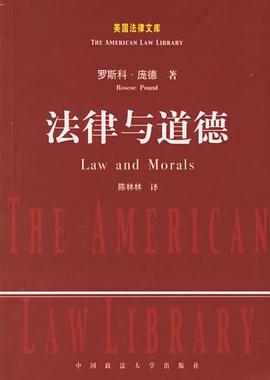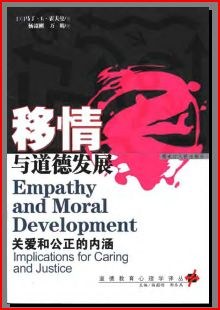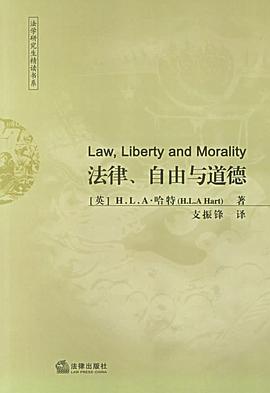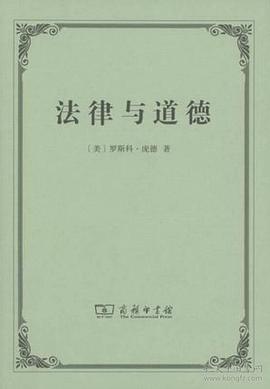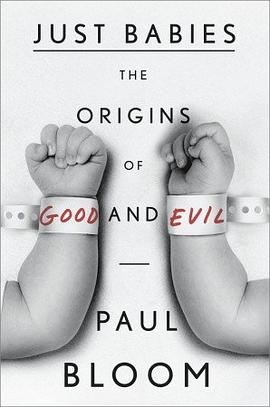

具体描述
From John Locke to Sigmund Freud, philosophers and psychologists have long believed that we begin life as blank moral slates. Many of us take for granted that babies are born selfish and that it is the role of society—and especially parents—to transform them from little sociopaths into civilized beings. In Just Babies, Paul Bloom argues that humans are in fact hardwired with a sense of morality. Drawing on groundbreaking research at Yale, Bloom demonstrates that, even before they can speak or walk, babies judge the goodness and badness of others’ actions; feel empathy and compassion; act to soothe those in distress; and have a rudimentary sense of justice.
Still, this innate morality is limited, sometimes tragically. We are naturally hostile to strangers, prone to parochialism and bigotry. Bringing together insights from psychology, behavioral economics, evolutionary biology, and philosophy, Bloom explores how we have come to surpass these limitations. Along the way, he examines the morality of chimpanzees, violent psychopaths, religious extremists, and Ivy League professors, and explores our often puzzling moral feelings about sex, politics, religion, and race.
In his analysis of the morality of children and adults, Bloom rejects the fashionable view that our moral decisions are driven mainly by gut feelings and unconscious biases. Just as reason has driven our great scientific discoveries, he argues, it is reason and deliberation that makes possible our moral discoveries, such as the wrongness of slavery. Ultimately, it is through our imagination, our compassion, and our uniquely human capacity for rational thought that we can transcend the primitive sense of morality we were born with, becoming more than just babies.
Paul Bloom has a gift for bringing abstract ideas to life, moving seamlessly from Darwin, Herodotus, and Adam Smith to The Princess Bride, Hannibal Lecter, and Louis C.K. Vivid, witty, and intellectually probing, Just Babies offers a radical new perspective on our moral lives.
作者简介
Paul Bloom is the Brooks and Suzanne Ragen Professor of Psychology at Yale University. He is the author or editor of six books, including the acclaimed How Pleasure Works. He has won numerous awards for his research and teaching, and his scientific and popular articles have appeared in The New York Times Magazine, Nature, The New Yorker, The Atlantic, Science, Slate, The Best American Science Writing, and many other publications. He lives in New Haven with his wife and two sons. Visit his website at paulbloomatyale.com and follow him on Twitter at @paulbloomatyale.
目录信息
Preface 1
1 The Moral Life of Babies 7
2 Empathy and Compassion 33
3 Fairness, Status, and
Punishment 59
4 Others 101
5 Bodies 131
6 Family Matters 159
7 How to Be Good 187
Acknowledgments 219
Notes 223
Index 265
· · · · · · (收起)
读后感
人之初,性善还是恶?这是个无法简单作答的问题。原因在于,成年人很难科学地观察和研究婴儿。不过,越来越多的证据在表明,婴儿出生不久便具备道德感,知道对什么感兴趣,并期待什么事情发生。换言之,他们能将好与坏区分开来,证明了善恶感并非完全由后天阅历所决定,而是与...
评分人活着,便有善恶之分。 善与恶似乎是自人类诞生之初,便想要彻底弄明白的深刻问题。《三字经》里开篇便讲,人之初,性本善。而中国古代的大儒荀子,却认为人之初,性本恶。而到了近代,更有学者指出,人之初,是无所谓善与恶的,新出生的婴儿犹如白纸一样干净,他将来想要为善...
评分人性善恶的问题也算是道德心理学的探讨范畴,关于人性的善恶问题,大致有如下几种观点:性善论、性恶论、混合论、白板说。这几种论点也不难理解。性善论认为人性本质上是善良的,孟子就持此观点;性恶论认为人性本质上是败坏的,基督教就秉持这种伦理;混合论认为人性本性既有...
评分之前看过bbC一个纪录片,讲的也是道德与善恶。纪录片通过脑结构图,基因和环境三方面来讲,最终的答案是基因决定了脑结构,脑结构决定了我们有没有成为心理变态者的潜质,而环境决定了我们会不会成为心理变态者,而这一切,我们却没有任何选择。看完纪录片后感到很绝望,直...
评分【曾小媛读书营·一年100本】14-善恶之源 人生来既有善也有恶,关键在于社会环境、教育、自我发展等等对善恶的教化程度,才让人分化出了好人与坏人。 当我们面对他人给予我们的恶时,大部分人会选择等待时机报复回去,也包括我,因为我们不是圣人,也并非佛祖。佛常说放下屠刀...
用户评价
不得不说,《Just Babies》这本书真的带给我太多惊喜了,我原本以为它会是一本比较轻松的读物,没想到它在某些层面上却有着相当的深度。我印象最深刻的是书中对细节的刻画,那种细腻入微的描写,让我仿佛亲眼目睹了那些场景,甚至能够感受到人物的情绪波动。有时候,我会因为书中某个角色的遭遇而感到揪心,也会因为他们克服困难时的坚韧而受到鼓舞。这本书让我开始反思自己的一些行为模式和思维方式,它迫使我去审视那些我习以为常的观念,然后去质疑,去探索。我特别喜欢它在处理一些比较复杂的情绪时所展现出的智慧,它不是简单地将情绪标签化,而是去深入剖析情绪产生的根源,以及它对人物内心世界的影响。我常常会在阅读的过程中,与书中的人物产生共鸣,感受到他们内心的挣扎和渴望。这本书的语言风格也非常吸引我,它既有诗意,又不失朴实,能够在一瞬间触动人心最柔软的部分。我喜欢它那种娓娓道来的感觉,没有丝毫的矫揉造作,就像一位智者在分享他的人生感悟。我经常会把书中的一些句子摘抄下来,时不时地拿出来品味,它们总能在不同的时刻给我带来新的启发。这本书对我来说,不仅仅是一本书,更像是一位良师益友,它在潜移默化中改变着我的认知,让我变得更加成熟和通透。我真的非常庆幸能够读到这本书,它让我的精神世界变得更加丰富和辽阔。
评分《Just Babies》这本书,说实话,我一直很难用简单的词语来概括它带给我的感受,它是一种非常复杂的情感体验。我喜欢它那种独特的叙事风格,它不像我之前读过的任何一本书,它有一种难以捉摸的魅力,让人欲罢不能。我尤其欣赏作者在处理一些比较敏感的话题时所展现出的智慧,它能够用一种非常温和而有力的方式,触及到人们内心的柔软。这本书带给我的思考是多维度的,它让我开始审视自己与周围世界的关系,以及我在其中的定位。我喜欢它那种能够引发共鸣的文字,它不仅仅是在讲述一个故事,更是在探讨人生的意义。我经常会在阅读过程中,发现自己被书中某些情节所打动,然后陷入长时间的思考。我喜欢它那种能够触及灵魂的语言,它能够轻易地触碰到我内心深处的情感。这本书对我来说,就像是一位智者,它在用一种温和而有力的方式,指引着我前进的方向。我真的非常感谢作者,能够创作出这样一本有深度、有力量的书。我还会继续沉浸在这本书的世界里,去挖掘更多的宝藏。
评分这本书我拿到手里有一段时间了,一直想静下心来好好写写感受,但总觉得有些方面抓不住重点,或者说,这本书带给我的触动实在太复杂了,难以用三言两语概括。我记得第一次翻开它的封面,纯粹是因为书名《Just Babies》带来的某种直觉,一种莫名的吸引力。我不是一个特别喜欢读故事类书籍的人,但这本书的开篇就有一种力量,它不像某些畅销书那样,上来就抛出惊天动地的情节,而是以一种非常平缓、甚至有些朴实的方式,将我带入了一个全新的视角。我尤其喜欢作者在描述一些细微之处时的笔触,那种对事物敏锐的观察力,让人仿佛身临其境。我经常会在阅读过程中停下来,反复咀嚼某些句子,试图去理解作者想要表达的那份深意。它不是那种读完就忘的书,而是会在你心中留下印记,让你在日常生活中不经意间想起它,然后产生新的思考。我尝试着去理解书中人物的动机,他们的困境,以及他们是如何在看似艰难的环境中寻找出路的。这本书给我最深刻的感受是,它打破了我原有的某些认知框架,让我看到了事情的另一面,一种我从未仔细审视过的可能性。我喜欢它那种不疾不徐的叙事节奏,让我在阅读时能够充分地放松下来,享受那种沉浸式的体验。我还会时不时地回翻一些章节,因为我总觉得,每一次重读都会有新的发现,新的理解。这本书就像一位老朋友,每次见面都能聊出新的话题,都能给我带来新的启发。我很难精确地描述它带给我的具体影响,但可以肯定的是,它在我心中留下了一道独特的色彩。
评分我最近读完的《Just Babies》这本书,确实让我有种意犹未尽的感觉,它所展现的某些思想内核,至今仍在我的脑海中回荡。我尤其欣赏作者构建的世界观,它既有现实的影子,又带有某种超现实的意味,让人在阅读时不禁产生一种奇妙的想象。我常常会在书中人物的对话中,捕捉到一些意味深长的信息,它们往往不是直白的陈述,而是需要细细揣摩才能理解的。我喜欢它那种层层递进的叙事方式,一开始可能只是一个简单的故事,但随着情节的展开,你会发现其中蕴含着更深层次的含义。这本书带给我的启示很多,它让我开始重新审视自己与周围世界的关系,以及我在其中的位置。我喜欢它那种不露声色的哲思,没有刻意的说教,而是将道理融入到故事的细节之中。我常常会在阅读过程中,发现自己被书中某些情节所打动,然后陷入深深的思考。我喜欢它那种能够触及灵魂的文字,它不仅仅是在讲述一个故事,更是在探讨人性的复杂和多面。我经常会把书中一些让我产生强烈共鸣的段落反复阅读,因为我总觉得,每一次阅读都能挖掘出新的意义。这本书对我来说,就像是一扇窗户,让我看到了一个我从未仔细观察过的世界,也让我对生活有了更深的理解。我真的非常感谢作者,能够创作出这样一本有力量的书。
评分我拿到《Just Babies》这本书已经有一段时间了,但它的影响力却丝毫没有减弱,反而随着时间的推移,我越来越能感受到它所带来的冲击。我喜欢它那种非常规的叙事方式,它没有按照传统的线性逻辑来展开,而是通过一些碎片化的叙事,让我自己去拼凑出完整的图景。我尤其欣赏作者对人物心理的刻画,那种深入骨髓的描绘,让我仿佛能够走进人物的内心深处,去感受他们的挣扎和渴望。这本书带给我的思考是深刻而持久的,它让我开始审视自己的一些固有观念,然后去质疑,去探索。我喜欢它那种不露痕迹的哲思,没有刻意的说教,而是将道理融入到故事的细节之中。我经常会在阅读过程中,被书中某些情节所触动,然后陷入长时间的思考。我喜欢它那种能够引发共鸣的文字,它不仅仅是在讲述一个故事,更是在探讨人生的复杂性。这本书对我来说,就像是一面镜子,它让我看到了自己内心深处的一些东西,也让我对生活有了更深的理解。我真的非常感谢作者,能够创作出这样一本有力量的书。
评分《Just Babies》这本书,让我有一种非常独特的感觉,它不像我之前读过的任何一本书,它有一种独特的韵味,一种难以言喻的魅力。我喜欢它那种不按常理出牌的叙事结构,它打破了我对传统故事的认知,让我感到耳目一新。我尤其欣赏作者在处理一些抽象概念时所展现出的智慧,它能够将那些复杂的思想用简单易懂的方式表达出来,让人容易接受。这本书带给我的思考是多方面的,它让我开始重新审视自己与世界的关系,以及我在其中的价值。我喜欢它那种能够触及灵魂的文字,它不仅仅是在讲述一个故事,更是在探讨人生的意义。我经常会在阅读过程中,被书中某些情节所打动,然后陷入深深的思考。我喜欢它那种能够引发共鸣的语言,它能够轻易地触碰到我内心深处的情感。这本书对我来说,就像是一位智者,它在用一种温和而有力的方式,指引着我前进的方向。我真的非常感谢作者,能够创作出这样一本有深度、有力量的书。我还会继续沉浸在这本书的世界里,去挖掘更多的宝藏。
评分这本书《Just Babies》着实让我眼前一亮,它所带来的感受是如此独特,以至于我很难用单一的词语来形容。我尤其喜欢作者在构思情节时的巧妙之处,它总是能够在我以为一切都已尘埃落定时,给我带来新的惊喜,让我不得不重新审视之前的判断。我常常会在书中人物的对话中,捕捉到一些暗含深意的线索,它们像是隐藏的宝藏,需要我细心挖掘才能发现。这本书带给我的思考是多角度的,它让我开始从不同的层面去理解一些看似简单的事情,然后从中发现它们背后隐藏的复杂性。我喜欢它那种能够引发共鸣的文字,它能够轻易地触碰到我内心深处的情感,让我感同身受。我经常会在阅读过程中,发现自己被书中某些情节所吸引,然后陷入长时间的思考。我喜欢它那种能够触及灵魂的语言,它不仅仅是在讲述一个故事,更是在探讨人生的意义。这本书对我来说,就像是一位引路人,它在用一种温和而有力的方式,指引着我前进的方向。
评分我拿到《Just Babies》这本书,一开始并没有抱太大的期望,但随着阅读的深入,我逐渐被它深深吸引。我喜欢它那种不拘一格的叙事方式,它没有按照传统的套路来展开,而是通过一些意想不到的转折,让我感到惊喜连连。我尤其欣赏作者在描绘人物情感时的细腻笔触,那种深入骨髓的刻画,让我仿佛能够走进人物的内心世界,去感受他们的喜怒哀乐。这本书带给我的思考是多方面的,它让我开始重新审视自己的一些固有观念,然后去质疑,去探索。我喜欢它那种不露痕迹的哲思,没有刻意的说教,而是将道理融入到故事的细节之中。我经常会在阅读过程中,被书中某些情节所触动,然后陷入长时间的思考。我喜欢它那种能够引发共鸣的文字,它不仅仅是在讲述一个故事,更是在探讨人生的复杂性。这本书对我来说,就像是一面镜子,它让我看到了自己内心深处的一些东西,也让我对生活有了更深的理解。我真的非常感谢作者,能够创作出这样一本有力量的书。
评分《Just Babies》这本书,说实话,我第一次读的时候并没有完全理解它的深意,但随着时间的推移,书中的一些画面和情节却越来越清晰地浮现在我的脑海中。我尤其喜欢作者在描绘人物内心世界时的笔触,那种细腻而精准的刻画,让我仿佛能够感受到人物的喜怒哀乐。这本书带给我的触动是持续性的,它不是那种读完就扔到一边的事情,而是会时不时地在我的脑海中闪现,引发我的思考。我喜欢它那种不走寻常路的叙事方式,它没有固定的套路,而是根据故事的发展自然地推进。我常常会在书中发现一些意想不到的转折,它们总是能够让我感到惊讶,然后更加投入地去阅读。我喜欢它那种能够引发共鸣的文字,它不仅仅是在讲述一个故事,更是在探讨人生的真谛。我经常会在阅读过程中,反思自己的生活,然后从中找到一些答案。这本书对我来说,就像是一个精神上的伴侣,它在陪伴我度过一些孤独的时光,也给了我很多前进的动力。我真的非常庆幸能够遇到这本书,它让我的内心变得更加丰盈,也让我对生活有了更深的感悟。我还会继续回味这本书,因为我相信,每一次重读都会有新的收获。
评分《Just Babies》这本书,在我阅读过程中,给我带来了很多意想不到的启发。我特别喜欢作者在处理一些比较抽象的概念时所展现出的能力,它能够用一种非常贴切的比喻,让那些难以理解的思想变得清晰可见。我常常会在书中发现一些自己从未留意过的细节,这些细节往往蕴含着深刻的含义,需要我反复推敲才能领悟。这本书带给我的思考是持续性的,它不是那种读完就遗忘的书,而是会在我脑海中留下深刻的印记,时不时地引发我的反思。我喜欢它那种不疾不徐的叙事节奏,它能够让我在阅读时充分地放松下来,享受那种沉浸式的体验。我经常会在阅读过程中,与书中的人物产生共鸣,感受到他们内心的挣扎和渴望。我喜欢它那种能够触及灵魂的文字,它不仅仅是在讲述一个故事,更是在探讨人性的复杂和多面。这本书对我来说,就像是一次精神的洗礼,它让我对生活有了更深的理解,也让我对未来充满了希望。
评分几个lunch break翻完了,没特别惊艳。好读是真的。
评分Great book.
评分3.5 stars, some of his conclusions are nothing new.
评分正义宝宝
评分简明清晰有趣。道德问题绝不只是可以跟谁和不能跟谁睡觉的问题,面对复杂的道德选择很多心肠好看电影爱掉眼泪儿的人一样会做出买椟还珠不能自圆其说的决定,支配道德行为的除了同情心和责任心还有我们对自己的认识和理性思辨的能力。关于儿童道德行为的实验非常有趣但其实只占本书内容一小部分。身为社会人我们大部分行为带有道德后果,要如何理清这些复杂头绪,我们天赋有哪些知识和能力,又有哪些知识和能力需要后天习得,是这本书的主旨。
相关图书
本站所有内容均为互联网搜索引擎提供的公开搜索信息,本站不存储任何数据与内容,任何内容与数据均与本站无关,如有需要请联系相关搜索引擎包括但不限于百度,google,bing,sogou 等
© 2026 book.wenda123.org All Rights Reserved. 图书目录大全 版权所有




